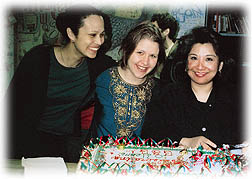 Last month at a winter social in the basement of Murray Dodge, graduate
students celebrated the 10th anniversary of the Graduate Student Government.
It was an occasion to mark the accomplishments of the organization and to
look back at its history.
Last month at a winter social in the basement of Murray Dodge, graduate
students celebrated the 10th anniversary of the Graduate Student Government.
It was an occasion to mark the accomplishments of the organization and to
look back at its history.
On the Campus - January 26, 2000
Website Exclusives...
Improving campus life for graduate
students
The Graduate Student Government takes on problems of a disparate
group of scholars
by Eric Adelizzi GS
 Last month at a winter social in the basement of Murray Dodge, graduate
students celebrated the 10th anniversary of the Graduate Student Government.
It was an occasion to mark the accomplishments of the organization and to
look back at its history.
Last month at a winter social in the basement of Murray Dodge, graduate
students celebrated the 10th anniversary of the Graduate Student Government.
It was an occasion to mark the accomplishments of the organization and to
look back at its history.
Ten years ago, there was wide support for an organization that would bring the needs of the graduate students to the administration. Christian Perring *96, a graduate student in philosophy, organized a public meeting to discuss the concerns of the graduate community.
"People I knew were tired of hearing that Princeton was primarily an undergraduate institution, and we were very aware that graduate students' concerns were not being heard, let alone dealt with," Perring recalls. "There was a strong sense of alienation from the main campus. One symptom of this was the disproportionate use of the counseling center by grad students."
A survey distributed in 1988 revealed that 97 percent of the respondents supported the formation of a graduate student union. Graduate students felt excluded from many aspects of student life, and cited difficulties with housing, inadequate health insurance coverage, low stipends and wages, and limited university services over the summer and breaks. A constitution was written and put forward for the approval of the graduate student body; over 90 percent of the students who voted approved the creation of the Graduate Student Union.
Last fall, the GSU changed its name to the Graduate Student Government, to reflect the fact that it isn't a labor union. The GSU was never a labor union, but the name was chosen to keep open the possibility, according to Perring. The group decided to close that possibility and try and find a niche in the university akin to that of the Undergraduate Student Government.
Over the last 10 years, the GSG has had several notable successes in its mission and in removing what GSG Press Secretary Beverley McKeon GS describes as "those little hiccups and major headaches that affect graduate life in Princeton." In fact, the pulling together of a disparate group of graduates, all of whom are working exceptionally hard, to present a united front to the administration is in itself an accomplishment. The GSG published a telephone directory of graduate students until the university around 1993 agreed to include them in the campus directory. It convinced the university to offer all-season sports tickets to graduate students on the same basis as undergraduates. It lobbied for ethernet connections to the Graduate College, and the university is now installing computer clusters in the graduate apartment complexes. As a result of GSG efforts, graduate students have access to the Princeton University Credit Union and dental insurance. Additionally, it has sponsored and cosponsored hundreds of social events on campus. As former chair Scott Harper GS
points out, all of this was accomplished in 10 years with less funding than the Undergraduate Student Government has for a single semester.
Current Chair Eszter Hargittai GS points out that there is still much work to be done. The GSG is looking into eye care options for graduate students, as well as lobbying for better health coverage, ethernet connections for the apartment complexes, additional parking, more reliable campus shuttle service, and more democratic representation on university committees. The problems of post-enrolled students (graduate students who stay beyond their fifth year and lose many benefits, including on-campus housing) is another major unresolved issue. As Harper points out, although much progress has been made in the last decade, there is still a feeling that "the university doesn't particularly appreciate graduate students, for either the people they are or the contributions they make."
Hargittai has been working on establishing "closer ties to the Undergraduate Student Government," because "both groups can benefit from a partnership on projects that impact all Princeton students."
As for the future, McKeon says, "As a student body, we have power and we should use it to be a real presence on campus." Hargittai adds, "I am confident that the next 10 years will resemble our first 10 by bringing similarly important improvements to our lives as graduate students at Princeton."
Eric Adelizzi is a doctoral student in chemical engineering.
GO TO the Table of Contents of the current issue
GO TO
PAW's home page